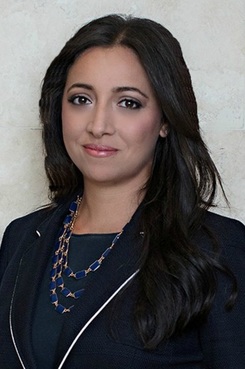How Firm Culture Affects the Success of Attorneys With Diverse Backgrounds
It's not easy being a young attorney of a diverse background. Much like Rocky was an underdog fighter with hopes of making it in the boxing world without much support, so too do many minority attorneys struggle to find their place in the legal market today.
September 07, 2018 at 01:22 PM
5 minute read
 Aya Salem, Conrad O'Brien
Aya Salem, Conrad O'Brien
It's not easy being a young attorney of a diverse background. Much like Rocky was an underdog fighter with hopes of making it in the boxing world without much support, so too do many minority attorneys struggle to find their place in the legal market today.
Since I began law school about a decade ago, diversity has been a hot topic among law firms and legal departments. Partially in response to a demand for diversity by clients in corporate America and partially recognizing the benefits of diversity themselves, more law firms have been investing in diversity initiatives. Many law firms, for example, participate in diversity job fairs for the opportunity to recruit minority and other diverse students. It was through one of these job fairs that I interviewed with Conrad O'Brien and hired as a summer associate. I was ultimately offered a full-time position, which I accepted, and I remain with Conrad O'Brien today, more than eight years later. But my experience is not typical.
Indeed, despite the efforts of law firms to recruit attorneys with diverse backgrounds, many firms continue to struggle to retain those attorneys, especially at the partner level. According to the National Association for Law Placement (NALP), black attorneys in 2017 only made up 1.8 percent of law firm partners. Asian, Latino and minority women attorneys do not fair much better, representing only 3.3 percent, 2.4 percent and 2.9 percent of law firm partners, respectively. Numerous articles have been written on what firms can do to help retain attorneys with diverse backgrounds, including a focus on how work is assigned, the evaluation process and the implementation of mentoring programs. While all of these steps can certainly help, I believe that the single most important reason why I remain at Conrad O'Brien and why I have been successful here is the firm's culture.
It is true that many firms are now committed to recruiting and retaining attorneys with diverse backgrounds, but it is also true that not all firm efforts are successful. Implementing an assignment model that ensures an equitable work-assignment process is helpful, but only initially. Many law firm associates have found that regardless of what work-assignment policy is in place, as time goes on partners, especially rainmaking partners, often select the associates based on existing relationships with them. It's inherent in the firm culture at many firms.
Studies have shown that people tend to select and mentor those who remind them of themselves. For minority attorneys, and attorneys with diverse backgrounds, that is bad news given how under-represented they are at the partner level. That means that even if diverse associates are initially receiving interesting and challenging work assignments, without more, they do not develop the partner relationships they need to continue receiving those assignments, thereby impacting their ability to grow and improve their skills as an attorney. If that happens, the result will often be a vicious cycle that dooms the associate's potential to make partner or justify staying on with the firm.
But it doesn't have to be that way.
Based on my experience, the reason for a firm's success at retaining attorneys with diverse backgrounds is the fact that the firm's partners and leadership take a sincere interest in their associates and the associates' professional development, including (and perhaps particularly) associates with diverse backgrounds. For example, in addition to ensuring that all associates receive an equal opportunity to work on complex and challenging assignments, in my case, partners at my firm took the time to mentor me—a female immigrant with different religious beliefs—to ensure my success at the firm. That mentorship went beyond a regularly scheduled meeting to address concerns or challenges I may have been facing. It consisted of partners taking the time to talk out case strategies and assignments, provide feedback, and to look at my mistakes as an opportunity to teach me, rather than write me off as an attorney.
I have found that the communication and feedback I received while working on a case contributed most to my development as an attorney. It not only provided me the opportunity to learn from each partner about his or her thought process and experience, but it also helped build the long-lasting relationships with these partners that ensured I continue receiving challenging and complex assignments. Indeed, it was because of the development of these sincere bonds that I felt comfortable enough to ask questions when necessary, and they likewise took an interest in seeing me achieve my career goals. It has been a very healthy cycle that all firms should hope to achieve for their minority attorneys.
In short, in order to retain diverse attorneys, efforts must go beyond implementation of policies for initial work assignments and forced mentorship programs. There must exist a firm culture wherein true bonds can be formed between the partners and the diverse attorneys of the firm, regardless of how different their backgrounds may be. Partners and senior associates must take a genuine and vested interest in mentoring and developing these associates so that the associates—and in turn, the firm —can succeed. After all, as everyone in Philadelphia knows, every Rocky needs a Mickey.
Aya M. Salem is a senior associate at Conrad O'Brien. She focuses her practice on representing Am Law 100 and regional firms in legal malpractice cases and other civil liability matters. She also concentrates on representing companies in products liability actions, defending toxic tort environmental exposure litigation.
This content has been archived. It is available through our partners, LexisNexis® and Bloomberg Law.
To view this content, please continue to their sites.
Not a Lexis Subscriber?
Subscribe Now
Not a Bloomberg Law Subscriber?
Subscribe Now
NOT FOR REPRINT
© 2025 ALM Global, LLC, All Rights Reserved. Request academic re-use from www.copyright.com. All other uses, submit a request to [email protected]. For more information visit Asset & Logo Licensing.
You Might Like
View All
Lackawanna County Lawyer Fails to Shake Legal Mal Claims Over Sex With Client
3 minute read

Conversation Catalyst: Transforming Professional Advancement Through Strategic Dialogue
5 minute readTrending Stories
- 1Thursday Newspaper
- 2Public Notices/Calendars
- 3Judicial Ethics Opinion 24-117
- 4Rejuvenation of a Sharp Employer Non-Compete Tool: Delaware Supreme Court Reinvigorates the Employee Choice Doctrine
- 5Mastering Litigation in New York’s Commercial Division Part V, Leave It to the Experts: Expert Discovery in the New York Commercial Division
Who Got The Work
J. Brugh Lower of Gibbons has entered an appearance for industrial equipment supplier Devco Corporation in a pending trademark infringement lawsuit. The suit, accusing the defendant of selling knock-off Graco products, was filed Dec. 18 in New Jersey District Court by Rivkin Radler on behalf of Graco Inc. and Graco Minnesota. The case, assigned to U.S. District Judge Zahid N. Quraishi, is 3:24-cv-11294, Graco Inc. et al v. Devco Corporation.
Who Got The Work
Rebecca Maller-Stein and Kent A. Yalowitz of Arnold & Porter Kaye Scholer have entered their appearances for Hanaco Venture Capital and its executives, Lior Prosor and David Frankel, in a pending securities lawsuit. The action, filed on Dec. 24 in New York Southern District Court by Zell, Aron & Co. on behalf of Goldeneye Advisors, accuses the defendants of negligently and fraudulently managing the plaintiff's $1 million investment. The case, assigned to U.S. District Judge Vernon S. Broderick, is 1:24-cv-09918, Goldeneye Advisors, LLC v. Hanaco Venture Capital, Ltd. et al.
Who Got The Work
Attorneys from A&O Shearman has stepped in as defense counsel for Toronto-Dominion Bank and other defendants in a pending securities class action. The suit, filed Dec. 11 in New York Southern District Court by Bleichmar Fonti & Auld, accuses the defendants of concealing the bank's 'pervasive' deficiencies in regards to its compliance with the Bank Secrecy Act and the quality of its anti-money laundering controls. The case, assigned to U.S. District Judge Arun Subramanian, is 1:24-cv-09445, Gonzalez v. The Toronto-Dominion Bank et al.
Who Got The Work
Crown Castle International, a Pennsylvania company providing shared communications infrastructure, has turned to Luke D. Wolf of Gordon Rees Scully Mansukhani to fend off a pending breach-of-contract lawsuit. The court action, filed Nov. 25 in Michigan Eastern District Court by Hooper Hathaway PC on behalf of The Town Residences LLC, accuses Crown Castle of failing to transfer approximately $30,000 in utility payments from T-Mobile in breach of a roof-top lease and assignment agreement. The case, assigned to U.S. District Judge Susan K. Declercq, is 2:24-cv-13131, The Town Residences LLC v. T-Mobile US, Inc. et al.
Who Got The Work
Wilfred P. Coronato and Daniel M. Schwartz of McCarter & English have stepped in as defense counsel to Electrolux Home Products Inc. in a pending product liability lawsuit. The court action, filed Nov. 26 in New York Eastern District Court by Poulos Lopiccolo PC and Nagel Rice LLP on behalf of David Stern, alleges that the defendant's refrigerators’ drawers and shelving repeatedly break and fall apart within months after purchase. The case, assigned to U.S. District Judge Joan M. Azrack, is 2:24-cv-08204, Stern v. Electrolux Home Products, Inc.
Featured Firms
Law Offices of Gary Martin Hays & Associates, P.C.
(470) 294-1674
Law Offices of Mark E. Salomone
(857) 444-6468
Smith & Hassler
(713) 739-1250






